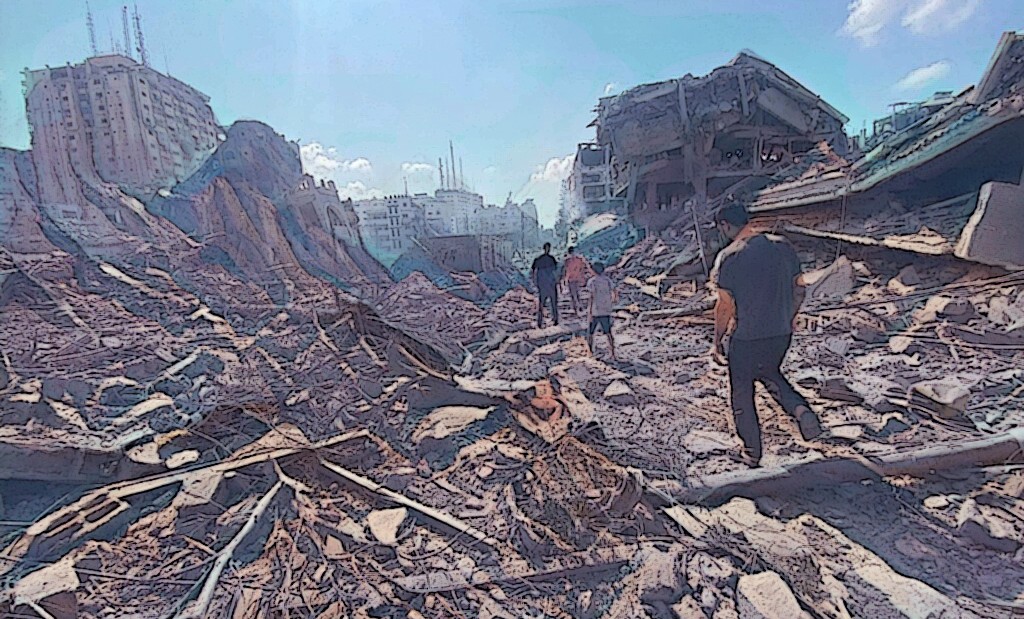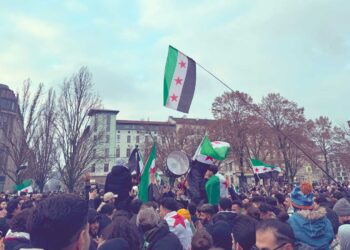A year has passed, a year of genocide, killing, destruction, and displacement, all under the watchful eyes of the world. A year has passed, and we are still here, powerless against this systematic killing, destruction, and displacement. We scream into a void that does not hear us, we weep over wounds that will not heal, and we protest before walls of absolute silence. We share images of massacres and write about endless violence, we appeal to the “civilized white Western world,” but nothing. We live under real and symbolic violence, unseen by many, yet it kills us slowly. This blatant and silent violence turns our suffering into consumable stories in the halls of the First World.
A year has passed, and there is no longer room for dialogue. Words have been exhausted. Those who know and remain silent are complicit in the crime, complicit in the genocide. Fleeting solidarity is no longer enough; what is needed is to confront those societies that fear looking at themselves in the mirror and to pay some of the prices. Everyone benefits from our bare lives, yet they fear acknowledging that the privileges they enjoy, the modernity they boast of, and the peace they live in, are fundamentally built on our destruction, on the continued killing of us under various names, on regarding us as beings without life or human value in the eyes of colonial modernity. A modernity that justifies genocide and systematic killing, silences us relentlessly, and sees us only as victims, collateral damage, or backward terrorists, with no history and no stories. Savage, individualistic societies strip us of our humanity, plan our deaths, while turning a blind eye to our suffering. They collude in their silence, turning our stories into material for their research and theses while we bleed.
A year has passed, and they still come to our lands, eat our food, dance to our music, and write about us as if they have the right to interpret us. They teach us how to liberate ourselves from our “backwardness,” how to fix our societies, ignoring that the real problem lies in their systems that steal our land, our freedom, and our right to live. They return to their warm homes, fearful of their fragile privileges, unwilling to confront their societies, systems, institutions, and universities that contribute to our killing. They do not speak about their false modernity and civilization. They develop their destructive weapons and artificial intelligence, boast about them, and create a renewed and continuous colonialism—a colonialism of ideas and narratives. They watch us, decide who gets to live and who must die. They impose their perceptions on us and turn us into subjects for their research, while real violence continues to destroy our bodies and lands.
A year has passed, and the brutal machine continues to devour our bodies, moving between Palestine, Lebanon, Syria, and beyond. Scattered corpses here and there, black and white bags holding torn bodies and dismembered limbs. Words have ended and faded into the noise of white hypocrisy and genocide. We remain alone, drowning in a deafening silence, burning whether in our homeland or in exile.
A year has passed, and everything has died. We walk from one grave to another, searching for a memory here and there, searching for shards of lost meanings. We cry until our souls overflow with tears, pain, and darkness. All that remains is the attempt to search for meanings, knowledge, and language from another place, from the heritage of our regions and similar places. There, among the old tales and forgotten stories, we might reconcile with a part of our history, rediscover our stolen identity, and draw from it the energy to understand our present and build our future. The accumulated heritage may carry within it the seeds of toppling dominant narratives. We dismantle these narratives, not to accept what they imposed on us, but to reclaim our stories buried in the shadows of the past, and write our future in our own language—a language born from the blood of our mothers and ancestors, protectors of our memories and history, and from our suffering that nourishes us every day. No matter how hard they try to bury us under empty slogans of liberation and civilization, we will rewrite our history in a language mixed with pain and resistance. We will reinvent our own meanings that slip through their grasp, reflect our experiences and stories, and refuse to be mere victims in their books.
A year has passed, and with it, all meanings have collapsed. What remains is a heavy void that fills everything. No one was spared, neither those who stayed in the country nor those who left. Whoever did not die carries their losses, trying to gather what is left of a lost life. We carry the places we lost, which never leave us but remain as weights in our hearts, accumulating like dust in a broken memory, exploding in our faces with every renewed moment of pain.
A year has passed, and they are still trying to silence our voices, chasing anyone who speaks, pursuing us in our workplaces, in the streets, and even in our narrow lives and minds. They fear the words, thoughts, and memories that may shake their perfect image of themselves. But we will carry what remains of our memories and stories with us wherever we go. We will tell them, no matter how long it takes. We will tell them over and over again, accumulate them, sift through them, and pass them on to our children and grandchildren, not only with our tongues but in our hearts and songs, in our books and narratives.
We will tell of the violence we have lived through, the pain we carry with us wherever we go—a pain inherited from those who came before us, carried since the first moments of defeat. A pain that can only be understood or felt by those who have lived it. We will narrate our history, our stories born from the blood of our bodies and the ashes of our homes. Not stories for pity or sympathy, but our personal stories, stories of our silent and loud struggles, and our repeated mistakes. Stories of our villages, cities, and homes that we lost over and over again, and stories of our attempts to care for one another. Stories that remind us we are not just victims and numbers, but peoples who rejoice, cry, regret, and err. Peoples resisting an unending colonialism and a historical violence that renews itself constantly.
We will tell of our lost dreams in the sea of darkness, and our struggles against oppressive regimes, unjust societies, and murderous parties, which are part of a chronic colonialism devouring our souls since time immemorial. We will talk about the nightmares of our countries, about attempts to escape and survive, about some of us dreaming of return. We will speak of stolen lands and usurped rights here and there, of countries filled with prisons and the darkness of their people. We will tell and tell without end, flooding the world with our stories, pains, and tales.
We will tell the story of the monster created by Western systems and peoples, which they feed with their lies and hypocrisy. We will tell how they continue to justify violence and genocide under the guise of supposed humanity. We will tell them of the dystopia we have witnessed without end, hoping they will one day realize that what we live through today is their inevitable future. It is the result of their modernity and the consequence of their long silence and fear for their privileges and hollow lives.








